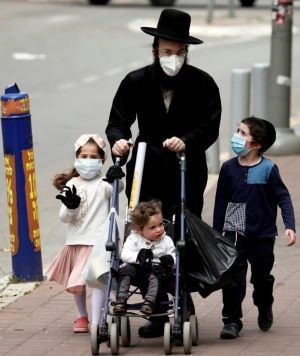 My friend Mendel Horowitz has a lovely essay on the op-ed page of the New York Times today. It's about one memorable Passover with his wife's bubby, her grandmother, a survivor. You could/should click on the link right here: https://www.nytimes.com/2020/04/07/opinion/passover.html?referringSource=articleShare Mendel is a New York guy, who moved his family to Jerusalem. He is a husband, father, rabbi, psychotherapist, volunteer first-responder, runner, Mets fan and soccer buff, and also very much a writer, currently working on a book about Orthodox Jewish men, group therapy and faith. We get together for lunch once a year or so when he comes back to Long Island. I love his stories about the male group sessions, or how, when he responds to a crisis with the medics, he never knows if the victim(s) will be speaking Hebrew or English or Arabic – “and it doesn’t matter.” Two years ago at this time his article on Passover and baseball was published in the Jewish Journal. https://jewishjournal.com/commentary/opinion/232675/why-is-this-sport-different/ I can only imagine how many Seders this evening will be asking why this year is different. One answer might be that Jeff McNeil should be swinging at the first pitch and smacking it into left-center field to set up a lead for Jacob DeGrom. I suspect there are deeper answers. * * * Another writer, my classmate from junior high and Jamaica High in Queens, Letty Cottin Pogrebin, is in the midst of a glorious career. She issues a personal newsletter from time to time, and in her current one she includes a snarky political cartoons and photos. For the why-is-this-year question, and how we can make the most of it, she reproduces a poem by Kitty O'Meara. (It has been attributed to Kathleen O’Meara, a writer of the 19th Century, but the Web says it is by Kitty O'Meara, a contemporary, different person. Thanks to reader Paul Rerecich for the update.) And People Stayed Home by Kitty O’Meara: And people stayed home and read books and listened and rested and exercised and made art and played and learned new ways of being, and stopped and listened deeper. someone meditated someone prayed someone danced someone met their shadow and people began to think differently and people healed and in the absence of people who lived in ignorant ways, dangerous, meaningless and heartless, even the earth began to heal and when the danger ended and people found each other grieved for the dead people and they made new choices and dreamed of new visions and created new ways of life and healed the earth completely just as they were healed themselves. * * * Letty finishes with her holy days wish: Wishing you a sweet Passover starting tomorrow night. A happy Easter on Sunday. And a generous Ramadan starting April 24. Stay strong, stay safe, stay home. – Letty “Chag Pesach Sameach" -- GV
Paul Rerecich
4/8/2020 09:23:14 am
Fact v Fiction: “And The People Stayed Home” Viral Poem By Kitty O’Meara (2020), Not Kathleen O’Mara (1869) https://womenyoushouldknow.net/fact-people-stayed-home-viral-poem-kitty-omeara-2020/
George Vecsey
4/8/2020 09:38:40 am
https://www.oprahmag.com/entertainment/a31747557/and-the-people-stayed-home-poem-kitty-omeara-interview/
Gene Palumbo
4/8/2020 01:19:53 pm
Mendel,
Mike from NW Queens
4/8/2020 01:58:25 pm
GV, thanks for the reminder and to all of my Jewish friends, worldwide, Happy Passover. God bless. Be safe and enjoy.
Alan D. Levine
4/8/2020 04:09:54 pm
George--a wonderful piece. And peace and health to you and your family.
ahron horowitz
4/8/2020 05:44:28 pm
george-thanks for the friendship to my family.happy and healthy holidays to the extended vescey group.
bruce
4/10/2020 09:54:31 pm
mendel,
bruce
4/12/2020 08:16:52 am
mendel, 4/13/2020 12:28:32 pm
It is presumptuous to say “Our Mendel”, but that is exactly how I felt when I realized that it was your NYT Op-Ed piece.
bruce
4/13/2020 12:41:29 pm
alan,
Mendel
4/13/2020 12:54:05 pm
Indeed, one of the most important Lithuanian yeshivas - rabbinical colleges - was exiled to Japan.
bruce
4/13/2020 01:02:05 pm
mendel, Comments are closed.
|
Categories
All
|









